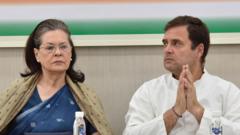In a significant escalation in the ongoing political drama in India, the country's Enforcement Directorate (ED) has charged senior Congress party leaders Sonia and Rahul Gandhi, as well as others, with money laundering. The party has announced nationwide protests slated for Wednesday in response to these allegations, which they have branded as a political maneuver aimed at discrediting opposition voices.
During a hearing in a Delhi court on Tuesday, the ED presented evidence against the Gandhis, claiming they orchestrated a scheme involving a shell company that allegedly facilitated the acquisition of assets from the National Herald newspaper, valued at over 20 billion rupees (approximately $233 million). Congress spokesperson Jairam Ramesh accused the government of engaging in "politics of vendetta and intimidation," which adds tension to an already fraught political landscape.
The investigation links several other Congress leaders, including its overseas chief, Sam Pitroda, and stems from a complaint lodged by Subramanian Swamy, a member of the ruling Bharatiya Janata Party (BJP), in 2021. Swamy alleged that the Gandhis leveraged party funds to gain control of Associated Journals Limited (AJL), the publisher of the National Herald, and had improperly acquired multi-million dollar assets through the company.
Congress asserts that it intervened to save AJL due to its significant historical importance, claiming to have lent the company over 900 million rupees throughout the years. AJL settled its debts in 2010 via a debt-equity swap which resulted in the creation of a non-profit entity called Young Indian. Sonia and Rahul Gandhi each retain 38% ownership in this company, with the balance held by other Congress officials.
Recent statements from the Enforcement Directorate have suggested that Young Indian secured AJL’s properties at a grossly undervalued price of 5 million rupees, leading to the issuance of asset seizure notices totaling 6.6 billion rupees across key Indian cities like Delhi and Mumbai. The case is set for a rematch in the courtroom on April 25.
Critics have noted that the Modi administration has increasingly weaponized government agencies like the ED against political adversaries. According to Reuters, since the Modi administration assumed power in 2014, the ED has summoned or targeted around 150 opposition political figures. The agency has also faced scrutiny for its handling of high-profile cases, such as the arrest of former Delhi Chief Minister Arvind Kejriwal last year in connection to an alleged liquor scandal, which occurred just before crucial electoral events.
The National Herald itself has a rich history, having been founded in 1938 by Jawaharlal Nehru, India’s inaugural Prime Minister and Rahul Gandhi’s great-grandfather. After halting publication in 2008 due to financial setbacks, it was reacquired by the Congress in 2010 and later reintroduced as a digital outlet in 2017. Historically significant, the National Herald is noted for its ties to India's independence movement and played a pivotal role in shaping modern journalism in the country.



















